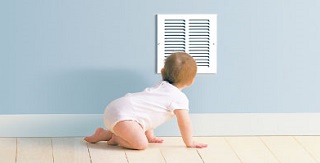From Guest Blogger Lizzie Weakly: Five Ways to Improve Your Home’s Air Quality

Toss the Clutter
Some of the clutter you have around your home could actually be impacting your IAQ. This is especially true of old books that tend to create an incredible amount of dust over the years. Taking the time to regularly clean up anything made of paper or fabric will reduce the number of areas where airborne irritants can reside.
Bring Some Plants Indoors
NASA has carried out a number of long-term studies on plants that filter the air. Many common houseplants can actually remove some of the worst airborne toxins including benzene, trichlorethylene, and formaldehyde. English ivy, snake plants, peace lilies, and chrysanthemums are all easy to care for and do an excellent job of filtering the air.
Tweak Your Humidity
Having too much or too little moisture in the air will promote the growth of mold, bacteria, and other substances that create airborne contaminants. Most homeowners will want to set their humidity between 30 percent and 50 percent. Keeping the humidity levels below 30 percent can cause respiratory irritation and increase the amount of dust in your home. When the humidity levels are above 50 percent, there is a very good chance of mold growth.
Leave Shoes and Jackets at the Door
Most of the toxins in your home were most likely brought in by your family. Germs and allergens often become trapped in overcoats, shoes, and sweaters. Leaving those items outside or at the door will limit the amount of cross-contamination that takes place in your home. You should also clean all outdoor clothes at least once or twice a month even if they are not dirty.
Test Your IAQ
No matter how much time and energy you spend improving your IAQ, airborne toxins could still be lurking in your home. That is why all homeowners should consider contacting companies such as AirCheck One to thoroughly test their indoor air quality for any hidden dangers. Once you have your inspection report, you can then continue to make improvements and changes throughout your home.
These simple tips will drastically improve the quality of air within your home and positively impact your family’s health and comfort.

Here’s another suggestion if you have a tightly sealed home: Get a heat recovery ventilation system.
For more information, do a google search on “heat recovery ventilator”.
The article was right on humidity. However, humidifiers are a nuisance to maintain properly. Unless they are cleaned often, they can grow mold and send the mold spores into the air. The misting type of humidifier will leave mineral dust all over the area, especially if the water is heavily mineralized. It seems that there is no easy and good solution.
If you have duct work have it tested for how much it leaks and have it sealed. Leaky ducts in crawlspaces suck in mold, moisture, termite poisons……and leaky ducts in attics suck in insulation, and hot air. Aeroseal seals ducts completely, from the inside out, tests them afterwards and prints a 10 year warranty.
It is true that leaky ducts can waste considerable energy. Unfortunately, because ducts are often in inaccessible places, it can be impossible to do much about it. Some building designers recommend having all ducts within the sealed building envelope so that leaked air will not waste energy.
It is only the return ducts which can suck in undesirable materials, and that can be a problem.
Hot air heat is less efficient than hot water heat partly because it takes more power to distribute heat by moving air than by moving water. Hot air heat tends to be popular partly because heating and cooling can use the same ducts even though doing so is less than optimal.
For comfortable heating, nothing beats hot water. Is quiet, draft free, and can maintain a very steady temperature.
There are many choices for heating and cooling. It makes sense to spend hours studying HVAC systems before designing a house. The optimal choices are somewhat climate dependent.